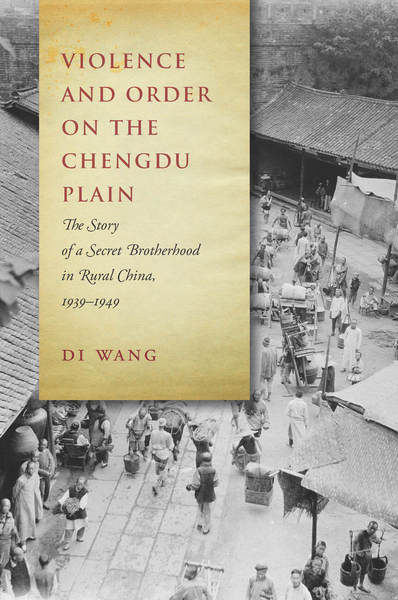
2018
280 pages.
from $30.00
Hardcover ISBN: 9781503604834
Paperback ISBN: 9781503605305
Ebook ISBN: 9781503605336
In 1939, residents of a rural village near Chengdu watched as Lei Mingyuan, a member of a violent secret society known as the Gowned Brothers, executed his teenage daughter. Six years later, Shen Baoyuan, a sociology student at Yenching University, arrived in the town to conduct fieldwork on the society that once held sway over local matters. She got to know Lei Mingyuan and his family, recording many rare insights about the murder and the Gowned Brothers' inner workings.
Using the filicide as a starting point to examine the history, culture, and organization of the Gowned Brothers, Di Wang offers nuanced insights into the structures of local power in 1940s rural Sichuan. Moreover, he examines the influence of Western sociology and anthropology on the way intellectuals in the Republic of China perceived rural communities. By studying the complex relationship between the Gowned Brothers and the Chinese Communist Party, he offers a unique perspective on China's transition to socialism. In so doing, Wang persuasively connects a family in a rural community, with little overt influence on national destiny, to the movements and ideologies that helped shape contemporary China.
About the author
Di Wang is Professor of History at the University of Macau. He is the author of The Teahouse: Small Business, Everyday Culture, and Public Politics in Chengdu, 1900–1950 (Stanford, 2008).
"Di Wang's rich volume on the Sichuan Paoge offers a major contribution to the history of Chinese secret societies. Based in part on the fascinating thesis of a sociology student at Yenching University, the study brilliantly illuminates the complex linkages between rural society and culture, the limits of local government, and Western-inspired intellectual efforts to arrive at a new understanding of peasant life."
—David Ownby, author of Brotherhoods and Secret Societies in Early and Mid-Qing China
"Violence and Order on the Chengdu Plain is the first monograph in English that is solely dedicated to the study of paoge, one of the most influential secret societies in the upper- and middle-Yangzi regions in pre-1949 China. An elegant microhistory, this work weaves an intimate study with larger social and political contexts involving rebellions, revolutions, foreign invasion, state penetration, and peasant resistance that characterized twentieth-century China."
—Huaiyin Li, University of Texas at Austin
"Without doubt, Di Wang's new book represents an excellent example of a microhistory writing in the field of modern Chinese history."
—Shaofan An, Frontiers of History in China
"Every once in a blue moon, this reviewer finishes a book and thinks: 'Now this is the kind of book I aspire to write.' Di Wang's Violence and Order on the Chengdu Plain is one of those rare books....Full of pathos and interwoven with complex narratives, Violence and Order is rich in anthropological and sociological data collected in the 1930s and 1940s, and complete with entertaining and humanizing historical anecdotes."
—Kelly Hammond, China Review International
"Violence and Order on the Chengdu Plain is an illuminating study of how secret societies operated in early twentieth-century Sichuan and how they have been understood....[The book] adds to the recent flourishing of studies of Sichuan in the Republican period."
—Henrietta Harrison, Journal of Asian Studies
"Violence and Order on the Chengdu Plain is a far-reaching contribution to scholarship on secret societies, local governance, popular culture, and rural society in the first half of China's twentieth century that deserves to be widely read, by both specialists and nonspecialists alike."
—Benno R. Weiner, Twentieth-Century China
"Wang has made an impressive contribution to our understanding of Chinese secret societies, specifically the Paoge....this book is highly readable and is a welcome addition to the historiography of modern China."
—Hongyan Xiang, Pacific Affairs